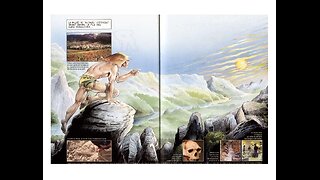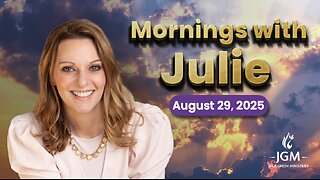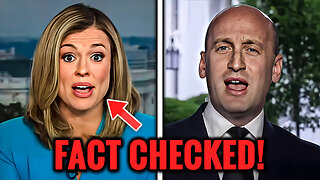Premium Only Content

Other Worlds: The Turner Diaries Chapter 2, a Puke (TM) Audiobook
Internal passports, gun seizures, a decaying economy,
fear of being branded a racist...an impossible America.
Chapter Two.
September 18, 1991: These last two days have really been a
comedy of errors, and today the comedy nearly became a tragedy.
When the others were finally able to wake me tip yesterday, we put
our heads together to figure what to do. The first thing, we all
agreed, was to arm ourselves and then to find a better hideout.
Our unit-that is, the four of us-leased this apartment under a false
name nearly six months ago, just to have it available when we
needed it. (We just beat the new law which requires a landlord to
furnish the police with the social security number of every new
tenant, just like when a person opens a bank account.) Because
we've stayed away from the apartment until now, I'm sure the
political police haven't connected any of us with this address.
But it's too small for all of us to live here for any length of time,
and it doesn't offer enough privacy from the neighbors. We were
too anxious to save money when we picked this place.
Money is our main problem now. We thought to stock this place
with food, medicine, tools, spare clothing, maps-even a bicycle-but
we forgot about cash. Two days ago, when the word came that they
were starting the arrests again, we had no chance to withdraw
money from the bank; it was too early in the morning. Now our
accounts are surely frozen.
So we have only the cash that was in our pockets at the time: a
little over $70 altogether (Note to the reader: The "dollar" was the
basic monetary unit in the United States in the Old Era. In 1991,
two dollars would buy a half-kilo loaf of bread or about a quarter
of a kilo of sugar.)
And no transportation except for the bicycle. According to plan,
we had all abandoned our cars, since the police would be looking
for them. Even if we had kept a car, we would have a problem
trying to get fuel for it.
Since our gasoline ration cards are
magnetically coded with our social security numbers, when we
stuck them into the computer at a filling station they would show
blocked quotas-and instantaneously tell the Feds monitoring the
central computer where we were.
Yesterday George, who is our contact with Unit 9, took the
bicycle and pedaled over to talk to them about the situation.
They're a little better off than we are, but not much. The six of
them have about $400, but they're crowded into a hole in the wall
which is even less satisfactory than ours, according to George.
They do have four automobiles and a fair-sized store of fuel,
though. Carl Smith, who is with them, made some very convincing
counterfeit license plates for everyone with a car in his unit. We
should have done the same, but it's too late now.
They offered George one car and $50 cash, which he gratefully
accepted. They didn't want to let go of any of their gasoline,
though, other than the tankful in the car they gave us.
That still left us with no money to rent another place, nor enough
gas to make the round trip to our weapons cache in Pennsylvania
and back. We didn't even have enough money to buy a week's
groceries when our food stock ran out, and that would be in about
another four days.
The network will be established in ten days, but until then we are
on our own. Furthermore, when our unit joins the network it is
expected to have already solved its supply problems and be ready
to go into action in concert with the other units.
If we had more money we could solve all our problems, including
the fuel problem. Gasoline is always available on the black market,
of course-at $10 a gallon, nearly twice what it costs at a filling
station.
We stewed over our situation until this afternoon. Then, desperate
not to waste any more time, we finally decided to go out and take
some money. Henry and I were stuck with the chore, since we
couldn't afford for George to get arrested. He's the only one who
knows the network code.
We had Katherine do a pretty good makeup job on us first. She's
into amateur theater and has the equipment and know-how to really
change a person's appearance.
My inclination was just to walk into the first liquor store we came
to, knock the manager on the head with a brick, and scoop up the
money from the cash register.
Henry wouldn't go along with that, though. He said we couldn't
use means which contradicted our ends. If we begin preying on the
public to support ourselves, we will be viewed as a gang of
common criminals, regardless of how lofty our aims are. Worse,
we will eventually begin to think of ourselves the same way.
Henry looks at everything in terms of our ideology. If something
doesn't fit, he'll have nothing to do with it.
In a way this may seem impractical, but I think maybe he's right.
Only by making our beliefs into a living faith which guides us
from day to day can we maintain the moral strength to overcome
the obstacles and hardships which lie ahead.
Anyway, he convinced me that if we are going to rob liquor
stores we have to do it in a socially conscious way. If we are going
to cave in people's heads with bricks, they must be people who
deserve it.
By comparing the liquor store listings in the Yellow Pages of the
telephone directory with a list of supporting members of the
Northern Virginia Human Relations Council which had been
filched for us by the girl we sent over there to do volunteer work
for them, we finally settled on Berman's Liquors and Wines, Saul
I. Berman, proprietor.
There were no bricks handy, so we equipped ourselves with
blackjacks consisting of good-sized bars of Ivory soap inside long,
strong ski socks. Henry also tucked a sheath knife into his belt.
We parked about a block and a half from Berman's Liquors,
around the corner. When we went in there were no customers in
the store. A Black was at the cash register, tending the store.
Henry asked him for a bottle of vodka on a high shelf behind the
counter.
When he turned around I let him have it at the base of the
skull with my "Ivory special." He dropped silently to the floor and
remained motionless.
Henry calmly emptied the cash register and a cigar box under the
counter which held the larger bills. We walked out and headed for
the car We had gotten a little over $800. It had been surprisingly
easy.
Three stores down Henry suddenly stopped and pointed out the
sign on the door: "Berman's Deli." Without a moment's hesitation
he pushed open the door and walked in. Spurred on by a sudden,
reckless impulse I followed him instead of trying to stop him.
Berman himself was behind the counter, at the back. Henry lured
him out by asking the price of an item near the front of the store
which Berman couldn't see clearly from behind the counter.
As he passed me, I let him have it in the back of the head as hard
as I could. I felt the bar of soap shatter from the force of the blow.
Berman went down yelling at the top of his lungs. Then he started
crawling rapidly toward the back of the store, screaming loudly
enough to wake the dead. I was completely unnerved by the racket
and stood frozen.
Not Henry though. He leaped onto Berman's back, seized him by
the hair, and cut his throat from ear to ear in one, swift motion.
The silence lasted about one second. Then a fat, grotesque-
looking woman of about 60-probably Berman's wife -came
charging out of the back room waving a meat cleaver and emitting
an ear-piercing shriek.
Henry let fly at her with a large jar of kosher pickles and scored a
direct hit. She went down in a spray of pickles and broken glass.
Henry then cleaned out the cash register, looked for another cigar
box under the counter, found it, and scooped the bills out.
I snapped out of my trance and followed Henry out the front door
as the fat woman started shrieking again. Henry had to hold me by
the arm to keep me from running down the sidewalk.
It didn't take us but about 15 seconds to walk back to the car, but
it seemed more like 15 minutes. I was terrified. It was more than
an hour before I had stopped shaking and gotten enough of a grip
on myself to talk without stuttering. Some terrorist!
Altogether we got $1426-enough to buy groceries for the four of
us for more than two months. But one thing was decided then and
there: Henry will have to be the one to rob any more liquor stores.
I don't have the nerves for it-although I had thought I was doing all
right until Berman started yelling.
September 19: Looking back over what I've written, it's hard to
believe these things have really happened. Until the Gun Raids two
years ago, my life was about as normal as anyone's can be in these
times.
Even after I was arrested and lost my position at the laboratory, I
was still able to live pretty much like everyone else by doing
consulting work and special jobs for a couple of the electronics
firms in this area. The only thing out of the ordinary about my
lifestyle was my work for the Organization.
Now everything is chaotic and uncertain. When I think about the
future I become depressed. It's impossible to know what will
happen, but it's certain that I'll never be able to go back to the
quiet, orderly kind of life I had before.
Looks like what I'm writing is the beginning of a diary. Perhaps it
will help me to write down what's happened and what my thoughts
are each day. Maybe it will add some focus to things, some order,
and make it easier for me to keep a grip on myself and become
reconciled to this new way of life.
It's funny how all the excitement I felt the first night here is gone.
All I feel now is apprehension. Maybe the change of scenery
tomorrow will improve my outlook. Henry and I will be driving to
Pennsylvania for our guns, while George and Katherine try to find
us a more suitable place to live.
Today we made the preparations for our trip. Originally, the plan
called for us to use public transportation to the little town of
Bellefonte and then hike the last six miles into the woods to our
cache. Now that we have a car, however, we'll use that instead.
We figured we only need about five gallons of gasoline, in
addition to that already in the tank, to make the round trip.
To be on the safe side, we bought two five-gallon cans of gas from the
taxi-fleet operator in Alexandria who always bootlegs some of his
allotment.
As rationing has increased during the last few years, so has petty
corruption of every sort. I guess a lot of the large-scale graft in the
government which Watergate revealed a few years back has finally
filtered down to the man in the street. When people began realizing
that the big-shot politicians were crooked, they were more inclined
to try to cheat the System a little themselves. All the new rationing
red tape has just exacerbated the tendency-as has the growing
percentage of non-Whites in every level of the bureaucracy.
The Organization has been one of the main critics of this
corruption, but I can now see that it gives us an important
advantage. If everybody obeyed the law and did everything by the
book, it would be nearly impossible for an underground group to
exist.
Not only would we not be able to buy gasoline, but a thousand
other bureaucratic obstacles with which the System increasingly
hems the lives of our fellow citizens would be insurmountable for
us. As it is, a bribe to a local official here or a few dollars under the
counter to a clerk or secretary there will allow us to get around
many of the government regulations which would otherwise trip us
up.
The closer public morality in America approaches that of a
banana republic, the easier it will be for us to operate. Of course,
with everyone having his hand out for a bribe, we'll need plenty of
money.
Looking at it philosophically, one can't avoid the conclusion that
it is corruption, not tyranny, which leads to the overthrow of
governments. A strong and vigorous government, no matter how
oppressive, usually need not fear revolution. But a corrupt,
inefficient, decadent government-even a benevolent one-is always
ripe for revolution. The System we are fighting is both corrupt and
oppressive, and we should thank God for the corruption.
The silence about us in the newspapers is worrisome.
The Berman thing the other day wasn't connected to us, of course, and
it was given only a paragraph in today's Post. Robberies of that
sort-even where there is killing involved-are so common these
days that they merit no more attention than a traffic accident.
But the fact that the government launched a massive roundup of
known Organization members last Wednesday and that nearly all
of us, more than 2,000 persons, have managed to slip through their
fingers and drop out of sight-why isn't that in the papers? The news
media are collaborating closely with the political police, of course,
but what is their strategy against us?
There was one small Associated Press article on a back page of
yesterday's paper mentioning the arrest of nine "racists" in Chicago
and four in Los Angeles on Wednesday. The article said that all 13
who were arrested were members of the same organization-
evidently ours-but no further details were given. Curious!
Are they keeping quiet about the failure of the roundup so as not
to embarrass the government? That's not like them.
Probably, they're a little paranoid about the ease with which we
evaded the roundup. They may have fears that some substantial
portion of the public is in sympathy with us and is aiding us, and
they don't want to say anything that will give encouragement to our
sympathizers.
We must be careful that this false appearance of "business as
usual" doesn't mislead us into relaxing our vigilance. We can be
sure that the political police are in a crash program to find us. It
will be a relief when the network is established and we can once
again receive regular reports from our informants as to just what
the rascals are up to.
Meanwhile, our security rests primarily in our changed
appearances and identities. We've all changed our hair styles and
either dyed or bleached our hair. I've begun wearing new glasses
with heavy frames instead of my old frameless ones, and Katherine
has switched from her contact lenses to glasses.
Henry has undergone the most radical transformation, by shaving off his
beard and mustache. And we all have pretty convincing fake
driver's licenses, although they won't stand up if they are ever
checked against state records.
Whenever any of us has to do something like the robberies last
week, Katherine can do a quick-change job and temporarily give
him a third identity. For that she has wigs and plastic gimmicks
which fit into the nostrils and inside the mouth and change the
whole structure of a person's face-and even his voice. They're not
comfortable, but they can be tolerated for a couple of hours at a
time, just as I can do without my glasses for a while if necessary.
Tomorrow will be a long, hard day.
-
 28:24
28:24
PukeOnABook
1 month agoRahan. Episode 175. By Roger Lecureux. The man from Tautavel. A Puke(TM) Comic.
58 -
 LIVE
LIVE
Matt Kohrs
7 hours agoMarket Open Chaos: PCE Inflation Report & Payday Friday || Live Trading
351 watching -
 LIVE
LIVE
JULIE GREEN MINISTRIES
1 hour agoLIVE WITH JULIE
16,970 watching -
 13:31
13:31
Adam Does Movies
18 hours ago $0.96 earnedAlien: Earth Episode 4 - Recrap
53.1K4 -
 9:02
9:02
Millionaire Mentor
17 hours agoCNN Host Left SPEECHLESS After Stephen Miller SHREDS Her Narrative
7.35K17 -
 LIVE
LIVE
BEK TV
23 hours agoTrent Loos in the Morning - 8/29/2025
349 watching -
 LIVE
LIVE
Times Now World
3 hours agoLIVE News | “Diplomacy of Cannons Is Over” – Maduro Challenges Washington | Times Now World
1,487 watching -
 1:09:09
1:09:09
Dialogue works
1 day ago $0.28 earnedScott Ritter: NATO is FINISHED
6.42K4 -
 LIVE
LIVE
FyrBorne
12 hours ago🔴Warzone M&K Sniping: I Can Be Your Idol (For Sniping)
143 watching -
 LIVE
LIVE
The Real Tombliboos - Live Streaming
5 hours ago🔴CHARITY DRIVE🔴12 HOURS🔴Extra Life Charity🔴#ExtraLife #extralife4kids - Round 1
56 watching